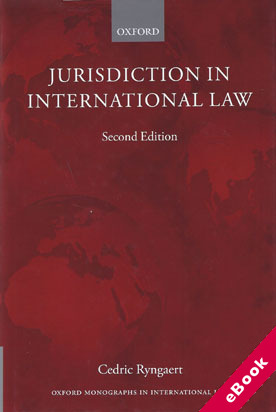
The device(s) you use to access the eBook content must be authorized with an Adobe ID before you download the product otherwise it will fail to register correctly.
For further information see https://www.wildy.com/ebook-formats
Once the order is confirmed an automated e-mail will be sent to you to allow you to download the eBook.
All eBooks are supplied firm sale and cannot be returned. If you believe there is a fault with your eBook then contact us on ebooks@wildy.com and we will help in resolving the issue. This does not affect your statutory rights.
This fully updated second edition of Jurisdiction in International Law examines the international law of jurisdiction, focusing on the areas of law where jurisdiction is most contentious: criminal, antitrust, securities, discovery, and international humanitarian and human rights law.
Since F.A. Mann's work in the 1980s, no analytical overview has been attempted of this crucial topic in international law: prescribing the admissible geographical reach of a State's laws.
This new edition includes new material on personal jurisdiction in the U.S., extraterritorial applicatins of human rights treaties, discussions on cyberspace, the Morrison case. Jurisdiction in International Law has been updated covering developments in sanction and tax laws, and includes further exploration on transnational tort litigation and universal civil jurisdiction.
The need for such an overview has grown more pressing in recent years as the traditional framework of the law of jurisdiction, grounded in the principles of sovereignty and territoriality, has been undermined by piecemeal developments. Antitrust jurisdiction is heading in new directions, influenced by law and economics approaches; new EC rules are reshaping jurisdiction in securities law; the U.S. is arguably overreaching in the field of corporate governance law; and the universality principle has gained ground in European criminal law and U.S. tort law. Such developments have given rise to conflicts over competency that struggle to be resolved within traditional jurisdiction theory.
This study proposes an innovative approach that departs from the classical solutions and advocates a general principle of international subsidiary jurisdiction. Under the new proposed rule, States would be entitled, and at times even obliged, to exercise subsidiary jurisdiction over internationally relevant situations in the interest of the international community if the State having primary jurisdiction fails to assume its responsibility.